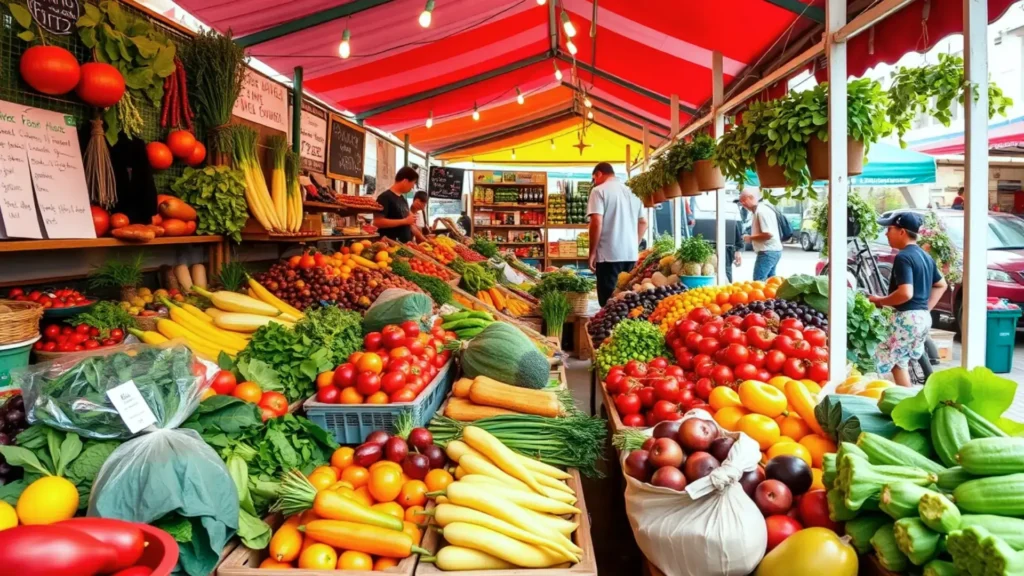How to save money on groceries during inflation is a concern for most households in 2025. Grocery prices are still feeling the heat of inflation. From eggs to onions, every trip to the supermarket seems heavier on the wallet. For many families, cutting grocery costs amid inflation isn’t just a goal, it’s become a necessity.
To save money on groceries during inflation, plan your weekly meals, create a fixed budget, compare prices online, and buy non-perishable items in bulk. Use discount and cashback apps to reduce overall spending.
1. Understanding Inflation and Its Effect on Grocery Costs
Inflation means your money buys less than it used to. It affects everything, from gas to groceries. According to the U.S. Bureau of Labor Statistics, the Consumer Price Index for food increased by 5.6% year-over-year as of March 2025. That’s a big jump when you consider how frequently we shop for food.
How inflation affects your grocery bill
- Higher production costs (fuel, packaging, labor) push prices up.
- Weather issues and supply chain delays lead to shortages and inflated costs.
- Global conflicts or trade disruptions make imported goods more expensive.
2025 forecasts suggest moderate inflation will continue throughout the year, which means now is the time to build inflation-proof grocery shopping strategies.
2. Budget-Friendly Grocery Shopping Tips for 2025
It’s important to be intentional about your expenses. These Grocery savings hacks can help you manage rising prices without compromising on quality:
- Create a clear grocery budget.
Use tools like Mint or simple spreadsheets to set a weekly or monthly grocery budget. This gives you a ceiling and helps track where your money goes. - Keep a shopping list.
Going to the store without a list is like going to war without armor. You’ll find things you don’t need. Keep a list on your phone and follow it. - Use a rewards credit card.
Some credit cards offer 3-6% cashback on grocery purchases. This is passive savings every time you shop. Pay off the balance in full every month to avoid interest. - Avoid shopping when hungry.
When your stomach is under control, you are more likely to eat impulsive foods.
3. Affordable Meal Planning During Inflation: Smart Strategies for 2025
Affordable meal planning during inflation isn’t about eating bland food. It’s about being smart with ingredients and reducing waste.

- Plan weekly meals.
Choose 5–6 meals for the week. This avoids the temptation to order takeout and helps you shop more efficiently. - Pick recipes with overlapping ingredients.
For example, use ground turkey for spaghetti on Monday and tacos on Wednesday. - Cook once, eat twice.
Make a big pot of chili and stretch it into two meals: chili bowls one day and chili nachos the next.
| Day | Meal Plan | Overlapping Ingredient |
|---|---|---|
| Monday | Spaghetti with meat sauce | Ground Turkey |
| Tuesday | Veggie stir-fry with rice | Bell Peppers |
| Wednesday | Tacos | Ground Turkey |
| Thursday | Fried rice with leftover veggies | Rice, Bell Peppers |
| Friday | Homemade pizza | Mozzarella, Veggies |
4. Smart Shopping Techniques
These grocery budgeting techniques are key to making smarter choices and cutting costs without compromising on quality.
- Shop at discount grocery stores.
ALDI plans to open over 225 new stores in 2025, offering big savings compared to traditional chains. - Use loyalty programs.
Many stores offer loyalty cards that earn points or provide discounts at checkout. - Check weekly flyers.
Plan your meals around what’s on sale that week. Combine sale items with coupons for double savings. - Buy store brands.
Most store-brand items are 20–30% cheaper than name brands, with similar taste and quality.
5. Buying in Bulk: Advantages and Considerations
- Best bulk buys
- Rice, beans, pasta
- Canned goods
- Toilet paper, paper towels
- Frozen fruits and veggies
- Watch out for perishables.
Buying a 10-lb bag of apples might seem like a deal, but if half go bad, it’s wasted money. - Compare unit prices.
Just because something’s sold in bulk doesn’t always mean it’s cheaper. Always check the unit price label.
6. Save Big with Store Brand Products
Store brands are a goldmine for savings.

- Same quality, lower price.
Studies show 60% of shoppers now prefer private-label brands for their affordability and quality. - Taste test.
Try a few store-brand versions of your regular items. Many will surprise you, and some might even be better than the name brands.
7. Save More with Seasonal and Local Produce
- Seasonal fruits and vegetables are fresher, cheaper, and taste better. Buying what’s in season helps with affordable meal planning during inflation.
- Plus, local markets and farmers’ stalls often sell produce at lower prices than big supermarkets. It’s a smart part of budget grocery shopping.

| Season | Best Produce Deals |
|---|---|
| Spring | Spinach, strawberries, asparagus |
| Summer | Corn, tomatoes, berries |
| Fall | Apples, squash, pumpkins |
| Winter | Citrus fruits, root vegetables |
8. Cut Food Waste, Save More Money
Wasting food is wasting money. Use these grocery budgeting techniques to stretch every dollar
- Store food properly.
Freeze meats, use airtight containers, and follow fridge guidelines to extend shelf life. - Use “first in, first out.”
Rotate older groceries to the front of the fridge or pantry so they’re used before newer ones. - Get creative with leftovers.
Leftover roast chicken? Make soup, tacos, or sandwiches the next day.
9. Cooking at Home vs. Dining Out
Cooking at home wins on both cost and health.
- Home-cooked meals cost 3–4x less than dining out, according to Bankrate.
- Use affordable staples.
Economical cooking recipes using eggs, lentils, rice, and seasonal veggies help you save while still eating well. - Budget your takeout.
Set a monthly budget for eating out so it doesn’t become a regular expense.
10. Exploring Alternative Shopping Options
Sometimes savings come from changing, where or how you shop.
- Online grocery services
Many offer first-time user discounts, subscription deals, or free delivery on bulk purchases. - CSA programs
Community-supported agriculture lets you buy a weekly box of fresh local produce, often cheaper than the store. - Food co-ops and bulk buying clubs
These let you share wholesale prices with other members. Some require memberships, but the savings can be big over time.
Learning how to save money on groceries during inflation isn’t about extreme couponing—it’s about making smarter choices every day.
11. Staying Informed About Market Trends
Knowledge helps you make smarter decisions.
- Watch food price indexes and inflation reports monthly.
- Follow reliable news sites like BLS.gov and financial news from Bankrate or Business Insider for updates.
- Adjust your habits.
If beef is up but chicken is stable, plan your meals around chicken. This is a simple way to keep your budget in check.
Conclusion
Rising costs won’t go away anytime soon, but you’re not powerless. With smart grocery shopping habits, low-cost meal planning, and a little effort each week, you can stay ahead of inflation without sacrificing good food.
By following these practical grocery savings hacks, you can build habits that save money week after week. Start small by choosing 2 or 3 of these strategies to try this week—every dollar saved counts, and over time, these simple changes can significantly reduce your food costs without drastically altering your lifestyle.
FAQs
Related Reads
#GroceryBudgeting #SavingsHacks #MealPlanning #BudgetShopping #FoodWasteReduction #SmartShopping #Budgeting

